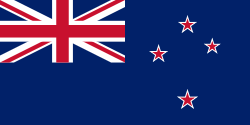| New Zealand at the 2010 Winter Paralympics | |
|---|---|
 | |
| IPC code | NZL |
| NPC | Paralympics New Zealand |
| Website | paralympics |
| in Vancouver | |
| Competitors | 2 in 1 sport |
| Flag bearer | Adam Hall [1] |
| Officials | 4 |
| Medals Ranked 15th |
|
| Winter Paralympics appearances (overview) | |
New Zealand sent a delegation to take part in the 2010 Winter Paralympics in Vancouver, British Columbia, Canada. The country fielded two athletes, both in alpine skiing. [2]
Contents
The country was also represented by four officials - a chef de mission, a coach, an assistant coach and a physiotherapist. [2]